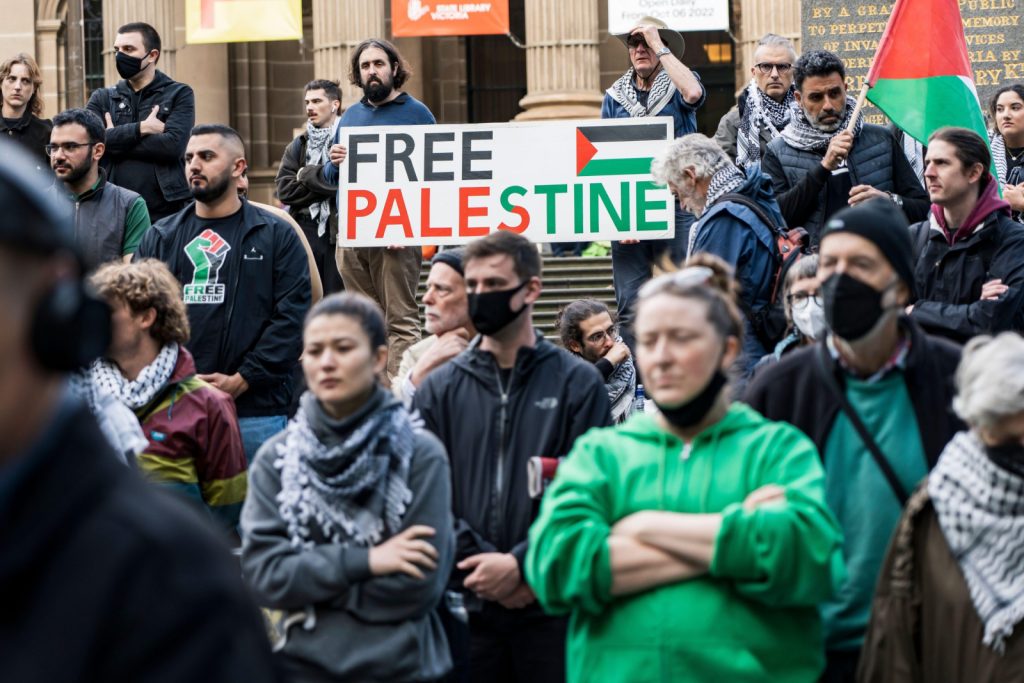IN THE MEDIA
ALP Must Resist the Activists on Israel
July 6, 2023 | Colin Rubenstein

An edited version of this article appeared in the Courier Mail – 6 July 2023
The Australian Labor Party is shortly going to have to decide if its policy on Middle East peacemaking is going to be based on misconceptions, symbolic “solidarity” and empty slogans, or common sense, reality, and international law. The upcoming ALP National Conference in Brisbane this August will be the key battleground for this debate.
The Victorian Labor State Conference on June 18 passed a resolution calling on the Albanese Government to recognise “Palestine” as a state during this term of parliament.
The Victoria resolution was part of a trend of activists in the party using state ALP conferences to pressure the ALP national leadership to take radical and counter-productive stances on Israeli-Palestinian issues. This trend largely started at the Queensland state ALP state conference in June 2021, in which pro-Palestinian activists within the ALP succeeded in passing a resolution absurdly condemning Israel for “the ethnic cleansing of Palestinians.” The resolution was so extreme that it was publicly criticised by numerous federal ALP spokespeople, including then-shadow Foreign Minister Penny Wong.
The Victorian resolution would likely be almost as unwelcome to our now Foreign Minister Wong, and PM Albanese, even if they have not said so.
While ALP National Conferences since 2018 have urged a Labor government to recognise Palestine “as a matter of priority” (and the Queensland ALP state conference this June 2-4 reiterated this call) Albanese and Wong have always insisted that, regardless of any such resolutions, whether and when to do so is up to the government. The Victorian resolution demanding it be done “this term” was an effort by activists in the party to insist – “No it’s not”.
These activists will try to send the same message at the ALP national conference in Brisbane on August 17-19.
Activists calling for Australian recognition of “Palestine” absurdly claim that recognising “Palestine” is the only way to save an Israeli-Palestinian two-state resolution. Nothing could be further from the truth.
Firstly, this idea directly undermines the peace process by violating the plain language of the Oslo Accords. It also contradicts settled international law, as it demands Australia recognise a “state” which clearly does not meet the criteria set down for one in the relevant global treaty, the 1933 Montevideo Convention on the Rights and Duties of States.
More importantly, on a practical level, recognising “Palestine” would unequivocally undermine rather than “save” hopes for a two-state peace.
The only way such a peace can possibly be achieved is for the Palestinians to agree to accept a future Israeli offer of a state in the framework of peace negotiations – which, sadly, the Palestinians have refused to even engage in since 2014.
Veteran Israeli Palestinian affairs analyst Ehud Ya’ari has summed up the current Palestinian leadership’s goal in two words: “Runaway state”. Ya’ari explains that, based on their own words, they have made it clear they are only interested in statehood if it is handed to them with no requirement to negotiate peace with Israel or compromise on any claims or grievances. This includes the fantasy of undoing Israel’s creation through the legally baseless and historically unprecedented “right of return” to pre-1967 Israel they claim for descendants of Palestinian refugees.
The key argument being made by ALP activists is to try to make Australia’s current policy seem outdated by misleadingly stating that 138 other countries have recognised Palestine. Yet, crucially, Sweden is the only Western democracy to have done so, while most of the other 137 countries that recognised “Palestine” did so in the context of the Cold War, at a time when many of them did not even recognise Israel itself. Given the choice, many of these countries would not recognise “Palestine” today.
And there are very good reasons why none of our allies have taken this premature and destructive step.
The primary reason there is no peace is the intransigence of the Palestinian leadership, which has rebuffed repeated efforts to achieve a two-state resolution. The Palestinian Authority walked away from generous offers of statehood made by Israel in 2000, 2001 and 2008, and has refused to negotiate about peace for the last decade. Meanwhile, Hamas turned Gaza into a terror enclave after Israel completely withdrew from the territory in 2005.
Rewarding intransigent and destructive Palestinian behaviour will only encourage such rejectionist behaviour to continue.
Prime Minister Anthony Albanese and Foreign Minister Penny Wong are doubtless aware of these realities.
They would know that to reduce foreign policy to hollow gestures would pointlessly create negative consequences for Australia, including angering the US and many European allies, and devaluing our hard-earned respect and credibility as an honest broker and reliable, middle-power Western democratic actor. Also, we would undermine our essential national interests in a stable international order.
In Brisbane, and indeed beyond, they will need to contain the activists in their own party who are prepared to damage those national interests to demand a self-defeating policy based on feel-good, pro-Palestinian slogans, and instead continue Australia’s long-standing bipartisan policy of providing strong, informed and genuine support for a negotiated, two-state outcome.
Dr. Colin Rubenstein is Executive Director of the Australia/Israel & Jewish Affairs Council (AIJAC).
Tags: ALP, Australia, Israel, Palestinians





